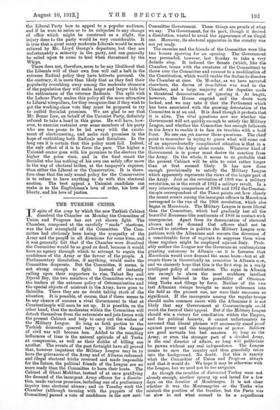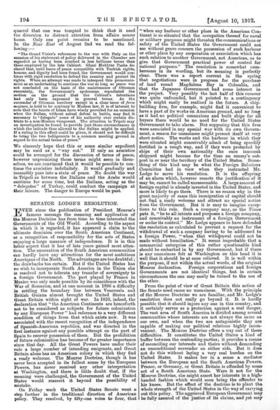1 .1.1:1E TURKISH CRISIS.
IN spite of the coup by which the new Turkish Cabinet dissolved the Chamber on Monday the Committee of Union and Progress has not yet shown fight. The Chamber, composed at the carefully " made" elections, was the last stronghold of the Committee. The Com- mittee bad obviously been losing the sympathy of the Army and the peop18 in all directions for some time, and it was .generally felt that if the Chamber were dissolved the Committee would be as good as dead, because it would have no agency through which to attempt to regain the confidence of the Army or the favour of the people. A Parliamentary dissolution, if anything, would make the Committee desperate. But the Committee, it seems, is not strong enough to fight. Instead of instantly calling upon their supporters to rise, Talaat Bey and Djavid Bey, the two members of the Committee who were the leaders of the extreme policy of Ottomanization.and the special objects of mistrust in the Army, have gone to Salonika. There they are no doubt taking stock of the situation. It is possible, of course, that if there seems to be any chance of success a rival Government to that at Constantinople will soon be set up. It is possible, on the other hand, that the moderates within the Committee will detach themselves from the extremists and join forces with the present Cabinet and help to carry out the wishes of the Military League. So long as both parties to the Turkish domestic quarrel tarry a little the danger of civil war will become less. Added to the reuniting influences of time is the natural aptitude of all Turks at compromise, as well as their dislike of killing one another. The events of the past fortnight have all proved that, however impatient the Military League may be to have the grievances of the Army and of Albania redressed and illegal electoral tricks reversed and made impossible for the future, the political friends of the League are no more ready than the Committee to burn their boats. The Cabinet of Ghazi Mukhtar, instead of at once gratifying the demand of the insurgent Army officers for a dissolu- tion, made various promises, including one of a preliminary inquiry into electoral abuses ; and on Tuesday week the Chamber (although teeming with the puppets of the Committee) passed a vote of confidence in the new anti- Committee Government. These things are proofs of what we say. The Government, for its part, though it desired a dissolution, wanted to avoid the appearance of an illegal one. Moreover, its electoral apparatus in the country was not yet ready.
The enemies and the friends of the Committee were like two boxers sparring for an opening. The Government was persuaded, however, last Sunday to take a very definite step. It induced the Senate (which, like the Chamber, teems with the creatures of the Committee) to throw over the Committee and consent to a modification of the Constitution, which would enable the Sultan to dissolve the Chamber at once. On Monday, as we have narrated elsewhere, the decree of dissolution was read in the Chamber, and a large majority of the deputies made a theatrical demonstration of ignoring it. At length, however, the House emptied and the doors were locked, and we may take it that the Parliament which has been associated with the growing detestation of the Committee is at an end. It is dead though it protests that it is alive. The vital questions now are whether the Government will act quickly enough to satisfy the Military League, and whether the Committee has enough followers in the Army to enable it to face its troubles with a bold front. No one can yet answer these questions. The chief point to remember in trying to guess what will come out of an unprecedentedly complicated situation is that in a, Turkish crisis the Army alone counts. Whatever kind of Government is in power must derive its sanction from the Army. On the whole, it seems to us probable that the present Cabinet will be able to exist rather longer than at first seemed likely. It has now done enough provisionally to satisfy the Military League which apparently represents the views of the larger part of the Army. Just as the revolution of 1908 was a military revolution, so is the revolt of 1912 a military revolt. In a very interesting comparison of 1908 and 1912 the Constan- tinople correspondent of the Times points out how closely the recent events among the insurgent officers in Macedonia correspond to the rise of the 1908 revolution, which also began in Macedonia. The Military League is more liberal than the Committee, which had gradually lost all the beautiful Rousseau-like sentiments of 1908 in contact with emergencies. Apart from its denunciation of electoral abuses and its demand that officers shall not be allowed to interfere in politics the Military League sym- pathizes with the Albanians and resents the diversion of a considerable force of regulars to suppress them when these regulars might be employed against Italy. Prob- ably neither the League nor the Government contemplates granting autonomy to Albania—as it is foreseen that Macedonia would soon demand the same boon—but at all events there is theoretically an armistice in Albania now, and we sincerely hope that this is the first step in a really intelligent policy of conciliation. The signs in Albania are enough to alarm the most stubborn intellect that ever believed in the possibility of Ottoman- izing Tosks and Ghegs by force. Neither of the two last Albanian risings brought so many tribesmen into the field as the present one, nor were their successes so significant. If the insurgents among the regular troops should make common cause with the Albanians it is not likely that any Government at Constantinople could resist the force of their appeal. But if the Military League should win a victory for conciliation within the Empire, and for political honesty, it cannot unfortunately be assumed that liberal phrases will necessarily stand proof against power and the temptations of power. Soldiers are good servants but bad masters. So long as the Army, or even the stronger part of a divided Army, is the real director of affairs, so long will politicians be pawns without any real independence. The League means to save the country and then grace i fully retire into the background. No doubt. But this is exactly what the Committee of Union and Progress always said that it would do. We hope it may be otherwise with the League, but we need not be too sanguine. As though the troubles of distracted Turkey were not already enough, another sprang up and lasted for a few days on the frontier of Montenegro. It is not clear whether it was the Montenegrins or the Turks who mistook the position of the frontier, but the Perte was so slow to end what seemed to be a superfluous quarrel that one was tempted to think that it used the diversion to distract attention from affairs nearer home. Only one point remains to be mentioned. In the Near East of August 2nd we read the fol- lowing :— " The Grand Vizier's references to the war with Italy on the occasion of his statement of policy delivered in the Chamber are regarded as having been couched in less bellicose terms than those employed by the late Cabinet. Ghazi Mukhtar Pasha de- clared that, until bases of peace compatible with Turkish rights, honour, and dignity had been found, the Government would con- tinue with rigid resolution to defend the country and protect its rights. When an attempt was made to interpret this pronounce- ment as an undertaking to continue the war so long as peace was not concluded on the basis of the maintenance of Ottoman suzerainty, the Government's spokesman repudiated the motion on the ground that the Cabinet's intentions had only been expressed in general terms. As the surrender of Ottoman territory except in a clear issue of force wajeure, is held to be contrary to Moslem law, it is of interest to note that the tenets of Islam have wisely provided for an occasion when the Sultan, without actual defeat in battle, may find it necessary to 'delegate' some of his authority over certain dis- tricts to a non-Moslem vicegerent. The situation in Tripoli may on investigation be found to provide just those circumstances in which the latitude thus allowed to the Sultan might be applied. If a ruling to this effect could be given, it should not be difficult to bring the two belligerents to a common meeting ground in regard to the actual terms of peace."
We sincerely hope that this or some similar expedient may be used as a " way out." If only an armistice could be arranged for the discussion of terms of peace, however unpromising those terms might seem in them- selves, we are convinced that it would be possible to con- tinue the armistice indefinitely. It would gradually and insensibly pass into a state of peace. No doubt the war in Tripoli as between the Italians and the Arabs would continue for some time, but the Italians, acting as the " delegates" of Turkey, could conduct the campaign at their leisure. The danger to Europe would be past.



































 Previous page
Previous page